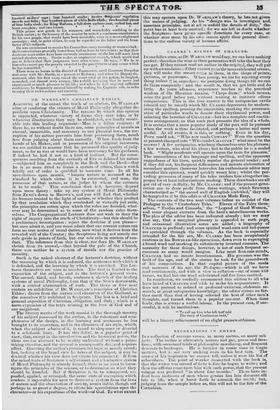CLARKE ' S RICHES or CSAticatit.• Ire our fallen state, as Dr.
W ARDLAW would say, we can have nothing perfect : therefore the wise in their generation will take the best they can get. If they cannot read an author in the originei, they will put up with a translation ; if they cannot gss, to the mostcelebrated scenes, they will make the scenes cosee to them, in the shape of prints,. pictures, or panoramas.. When young, we are for rejecting every thing unless tt he superfine: we postpone doing things till we can do them completely; and the result is, that we get little and do little. As years advance, experience teaches us the practical wisdom of the Horatian maxim, "Carpe diem:" which means, seize the good before you, without waiting to institute odious comparisons. This is the true answer to the antiquarian cavils (should any be raised) which Mr. CLARKE deprecates for modern- izing the spelling, pruning the impurities, marking the pronunci- ation of particular words to denote their rhythmical power, and selecting the beauties of CHAUCER—but in a complete and contin- uous arrangement, so that each part presents the idea of' a whole. It is certain that a more popular study of the poet will be pursued when the work is thus facilitated, and perhaps a better and more useful. At all events, it is this, or nothing. Even in his day, POPE could ask, "Who now reads COWLEY?" Were the question at present changed into "Who reads CHAUCER?" what must be the answer? A fete antiquaries, who busy themselves over his phrases; a few writers, who steal his ideas ; but to the public lie is a sealed book. "Slight accidents will operate upon the taste for pleasure." The uncouthness of his language and spelling, and the apparent ruggedness of his lines, quickly repulse the general reader; and if they did not, his frequent diffuseness and minute elaboration of secondary matters (however heterodox his enthusiastic editor may consider this opinion), would quickly weary him ; whilst the per- vading grossness of many of his tales renders him altogetherim- proper for at least indiscriminate reading. These drawbacks areall got rid of very skilfully, by Mr. CLARKE; and if the present gene- ration are to draw profit from these writings, which SPENSER characterized as" the sacred well of English undefiled," they will be tempted to it by this edition of CHAUCER Made Easy. The contents of the two neat volumes before us consist of the Prologue to the "Canterbury Tales." Eleven of the Tales them- selves, "Troilus and Cressida," the "Legend of Good Women," and some elegant extracts from the bard's miscellaneous works. The plan of the editor has been indicated already ; but we may also say, that a marginal glossary is appended to each page, and occasional illustrative notes are added ; a biography of CHAUCER is prefixed; and some spirited wood-cuts and tail-pieces are sprinkled through the volumes. As the book is especially intended for the fair sex, Mr. CLARKE has been scrupulously cautious in his Bowl:melt-like operations, down even to expunging a broad word and marking its substitute by inverted commas. The necessity for these doings, however, is not of such frequent oc- currence as many would imagine. Like most first-rate minds, CHAUCER had no innate licentiousness. His grossnes was the fault of his age, and of the stories he took for the groundwork of his compositions. In that capital picture of the mode and manners of his age, the Prologue—which is all we have read continuously, and with a view to collation—out of' some 850 verses, we find but one word substituted and five lines omitted.
In conclusion, we cordially recommend this edition to all who have heard of CHAUCER and wish to make his acquaintance. It does not pretend to refined or profound-criticism, elaborate re- search, or great antiquarian knowledge : the editor claims no fur- tiler merit than that of having selected the best of other men's thoughts, and turned them to a popular account. When donee fltirly, this is always a useful labour. In the present case, if sue- ceseful, it will be meritolious.
" To call up him who left half told The story of Cambuscan bold,"
will be a literary achievement of no slight praiseworthiness.






























 Previous page
Previous page